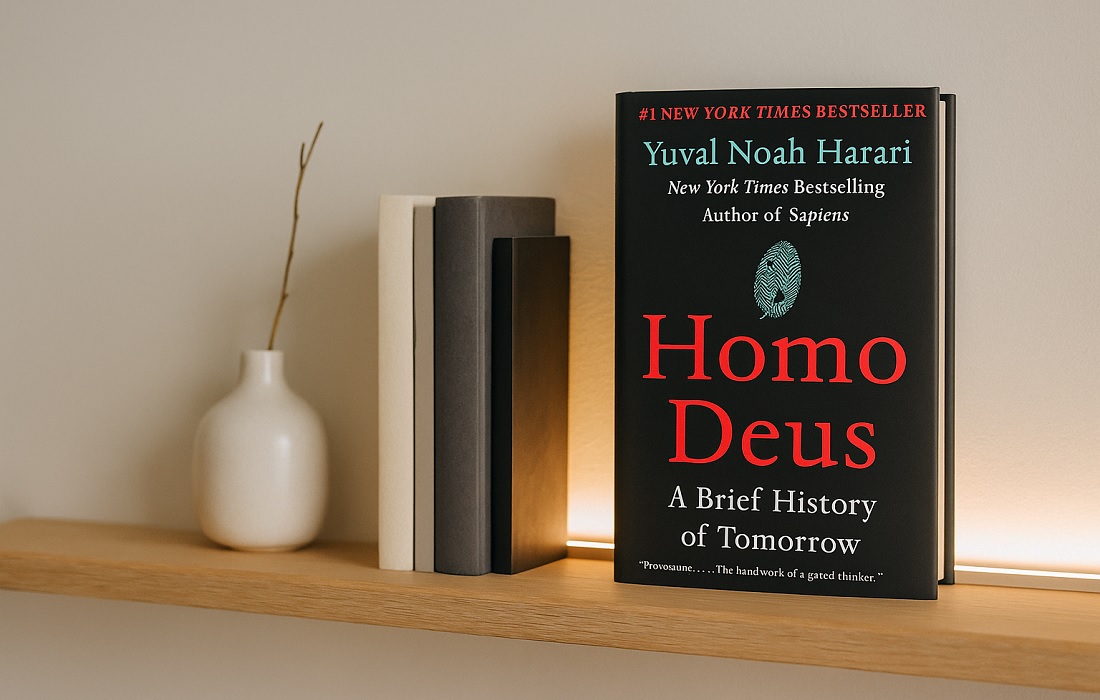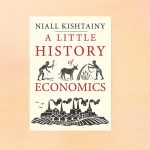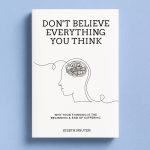Homo Deus: A Brief History of Tomorrow by Yuval Noah Harari invites us into a near future where humanity’s triumphs over famine, plague, and war pave the way for loftier and riskier ambitions: immortality, engineered bliss, and god‑like mastery over life. Homo Deus by Yuval Noah Harari blends history, science, and philosophy into a lucid thought experiment, mapping technological trajectories and ethical crossroads. This book is at once a warning and an invitation: to imagine the worlds we might create, to judge which futures deserve pursuit, and to steward our shared destiny with humility. Read it to provoke choices, not to accept them passively.
1. Introduction to Homo Deus by Yuval Noah Harari
Homo Deus by Yuval Noah Harari (2016) is both an audacious forecast and a philosophical meditation. It follows his celebrated Sapiens: A Brief History of Humankind, which traced humanity’s journey from prehistoric foragers to global dominance, and precedes 21 Lessons for the 21st Century, which focuses on present-day concerns.
In Homo Deus, Harari asks: having largely subdued famine, plague, and war – the age‑old scarcities that preoccupied Homo sapiens – what will occupy humanity’s attention in the coming centuries? His provocative answer is that humankind will turn to new projects: immortality, happiness, and divinity. The “god” in Homo Deus is not necessarily supernatural but refers to humanity’s ambition to attain god‑like powers over life, death, and creation through biotechnology, artificial intelligence, and data.
The book doesn’t predict inevitable futures but outlines plausible trajectories based on current trends in science, technology, and society, exposing the ethical dilemmas and existential risks embedded within them.
2. Author Biography: Yuval Noah Harari
– Born: 1976, Kiryat Ata, Israel.
– Education: PhD in History, University of Oxford (2002).
– Profession: Professor at the Hebrew University of Jerusalem, specializing in world history and macro‑historical processes.
– Notable works:
– Sapiens: A Brief History of Humankind (2014) – broad arc of human evolutionary and cultural history.
– Homo Deus (2016) – speculative account of the future trajectories of humanity.
– 21 Lessons for the 21st Century (2018) – focused on current global challenges.
– Public influence: Harari has advised governments, corporate leaders, and NGOs; he’s recognized for synthesizing complex academic fields into accessible works, though some critics find his forecasts speculative or philosophically loaded.
3. The Structure of Homo Deus
Harari organizes the book into three broad sections:
- The New Human Agenda – examining how humanity has shifted from survival to aspirations beyond basic needs.
- Homo Sapiens Gives Meaning to the World – tracing how myth, humanism, and shared stories shaped civilizations.
- Homo Sapiens Loses Control – exploring futures dominated by biotechnology, artificial intelligence, and “Dataism.”
4. Part I – The New Human Agenda
From Survival to Ambition
For most of history, humans were trapped in cycles dominated by famine, plague, and war. Drawing on historical data, Harari points to the dramatic decline in deaths from these causes in the 20th and 21st centuries. Today, more people die from diet‑related diseases like obesity than from starvation; infectious epidemics are rare compared to historical baselines; and violent deaths, including from war, have sharply declined proportionally.
These achievements free up human imagination and resources for new goals:
– Immortality: Extending human lifespans indefinitely through genetic engineering, nanotechnology, regenerative medicine, and AI‑mediated health monitoring.
– Bliss: Eliminating suffering through biochemical regulation of mood and direct neurological manipulation.
– Divinity: Enhancing human capabilities beyond natural limits to create “superhumans” or even forms of life unlike any seen before.
Harari warns that these ambitions carry both promise and peril: they could eliminate disease and suffering, but also deepen inequality, destabilize societies, and redefine what it means to be human.
5. Part II – Homo Sapiens Gives Meaning to the World
Harari’s central claim is that Homo sapiens conquered the planet thanks to their ability to create and believe in shared fictions – religions, nations, corporations, legal systems. These fictions coordinate behavior on an immense scale without requiring direct personal relationships.
The Storytellers
Shared myths – from ancient gods to modern human rights – allowed cooperation among large populations. Harari integrates anthropology and cognitive science here, arguing that these myths are biologically unreal but socially powerful.
The Odd Couple: Science and Empire
Modernity emerged from a feedback loop between scientific discovery and political/military expansion. The Age of Exploration and colonial domination were as much about new technologies and resource exploitation as about curiosity. Science provided tools to empire; empire provided resources and incentives for more science.
The Modern Covenant
The modern era replaced divine legitimacy with human control: the conviction that humans can shape destiny through knowledge, reason, and planning. This “covenant” drove industry, democracy, and education systems. But the same mindset underlies humanity’s ambition to reshape life itself.
The Humanist Revolution
Humanism enshrines the human experience as the ultimate source of meaning and authority. Variants – liberalism, socialism, nationalism – place “man” as the measure of all things. Harari notes humanism’s historical success but questions whether it can survive technologies that undermine the notion of individual free will.
6. Part III – Homo Sapiens Loses Control
This section provides the most speculative but also the most widely discussed content in Homo Deus.
The Time Bomb in the Laboratory
Advances in biotechnology threaten to hack the human mind and body. As we understand the brain’s biochemical processes more deeply, desires, emotions, and decisions may be open to manipulation. Genetic editing tools like CRISPR raise the possibility of engineered intelligence, physical prowess, or personality traits. The ethical lines between therapy and enhancement blur.
The Great Decoupling
Harari envisions a scenario where intelligence and consciousness separate: algorithms may outperform humans in analysis, planning, and prediction without possessing subjective experience. AI‑driven decision-making could reduce human roles in everything from law to art. Yet, in markets and governments, decisions might increasingly arise from algorithmic reasoning unfathomable to human minds.
The Ocean of Consciousness
Consciousness – the subjective experience of sensations – could become less economically relevant than informational processing capacity. If machines process data more efficiently without consciousness, the economic advantage may shift away from humans. This risks creating a large class of economically “useless” people, raising profound moral questions about welfare, identity, and dignity.
The Data Religion (Dataism)
Perhaps the most distinctive prediction in Homo Deus, Dataism posits that the universe is a flow of data and value derives from contributing to that flow. In this view, organisms are biochemical algorithms, and the highest good is to maximize data processing power. In Dataism, human narratives and personal experiences matter less than the collective efficiency of the “data flow.”
If adopted widely, Dataism could displace humanism as the dominant ideology, just as humanism displaced theism in much of the modern world. It reframes morality around the facilitation of data exchange and computation, even if that reduces human agency.
7. Thematic Synthesis
Harari’s forecast rests on several thematic pillars:
- Technological Trajectories
– Exponential improvements in AI, biotech, brain‑computer interfaces, and neuroengineering will reshape economies and identities.
– Automation may render many human skills obsolete, and augmentation may split humanity into enhanced elites and left-behind majorities.
- Redefining Humanity
– If intelligence detaches from consciousness, traditional humanist values – individuality, moral agency, human rights – may lose practical authority.
- New Religions and Myths
– Civilizations run on unifying stories. The story of human rights, equality, and democracy may be supplanted by algorithm‑centered ideologies.
- Ethical Risk
– These shifts could exacerbate inequality to unprecedented levels, destabilize governance, and even threaten species survival if mismanaged.
8. Integration with Contemporary Developments (Post‑2016)
Since the book’s publication:
– AI breakthroughs such as generative models have shown Harari’s warning about machines creating art, text, and decisions is more than speculative.
– Biotech advances – mRNA vaccines, CRISPR therapies – illustrate rapid timelines from concept to application.
– Data economics – major platforms now monetize global behavioral data streams, concentrating market power among a few corporations.
– Algorithmic governance is nascent in predictive policing, automated credit scoring, and content moderation, raising civil rights questions.
– Polarization around technology ethics has intensified, with debates over AI safety, digital divides, and state surveillance echoing Harari’s cautions.
9. Critiques and Counterpoints
While lauded for synthesizing wide‑ranging research and sparking debate, Homo Deus has faced criticism:
– Speculative extrapolation: Some forecasts rest on hypotheticals lacking robust probability estimates.
– Present‑biasing the future: Critics argue Harari projects contemporary issues too linearly, underplaying the unpredictability of breakthroughs or cultural shifts.
– Western framing: Certain examples and value judgments reflect globalized liberal contexts more than universally applicable experience.
– Underdeveloped optimism: While pointing to dangers, the narrative spends less time on positive pathways or countervailing social trends.
10. Enduring Value
Despite critiques, Homo Deus remains relevant for:
– Forcing readers to confront uncomfortable possibilities about the trajectory of human civilization.
– Encouraging holistic thinking – linking history, biology, economics, and philosophy.
– Articulating concepts like “Dataism” in memorable ways that serve as intellectual tools for public discourse.
It does not offer a roadmap but acts as an extended thought experiment, enabling individuals, policymakers, and technologists to rehearse ethical and strategic choices before confronting them in reality.
11. Conclusion
Homo Deus by Yuval Noah Harari invites its readers to imagine futures where humanity, having mastered survival, turns toward god‑like projects – only to risk self‑obsolescence. It compels reflection on what we value: is it consciousness, agency, equality, the sanctity of life, or simply the acceleration of information processing?
In outlining the possible erosion of humanism in favor of data‑driven ideologies, Harari presses his audience to safeguard the elements of humanity they wish to preserve – before technological momentum makes those decisions for us.
If you found this summary helpful, please share it or leave a comment below.





















